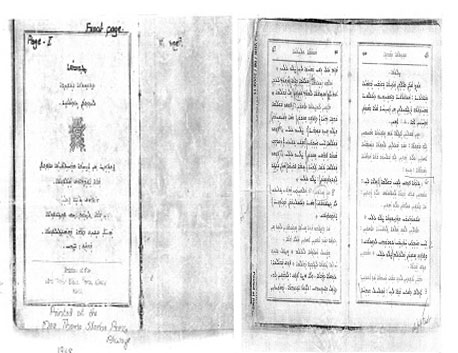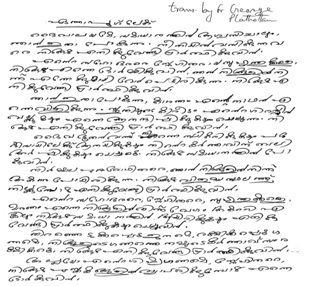Encyclopedia of Syriac chants
ഏത്താ പൂശ് ലേക്
Ēthā pūś lēk (Farewell, O Church)
Encyclopedia of Syriac Chants - Index
| CMSI Ref Number | (101-0018) EC-0018 |
| Title | Ēthā pūś lēk (Farewell, O Church) |
| Category | Chants from the Services for the Dead |
| Sub Category | Madrāśā |
| Liturgical Context | Funeral services for priest in the Syro Malabar Church |
The funeral service for priests consists of elaborate ceremonies that last for several hours. The rubrics given in K’ţāwā d’ţeśmeśta dahlāp annīdē (Mannanam, 1921, p. 220) prescribes this madrāśā as part of the farewell ceremony in which the pallbearers carry the casket in procession, first to the main altar and then to the entrances of the church. Although the chant is rendered solo here, in the actual service the congregation sings it in two groups by alternating the stanzas
| Syriac Text | Syriac Text |
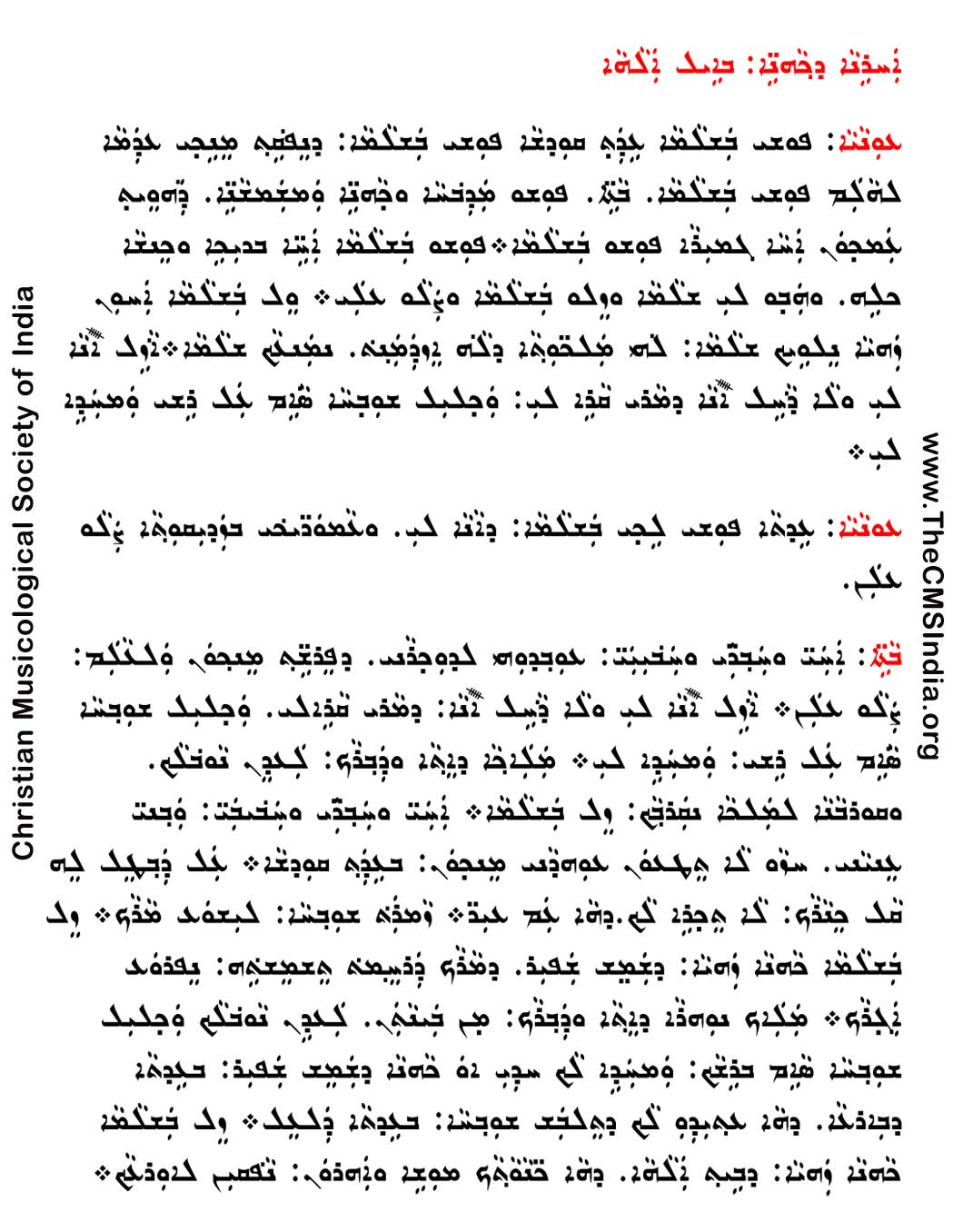
|
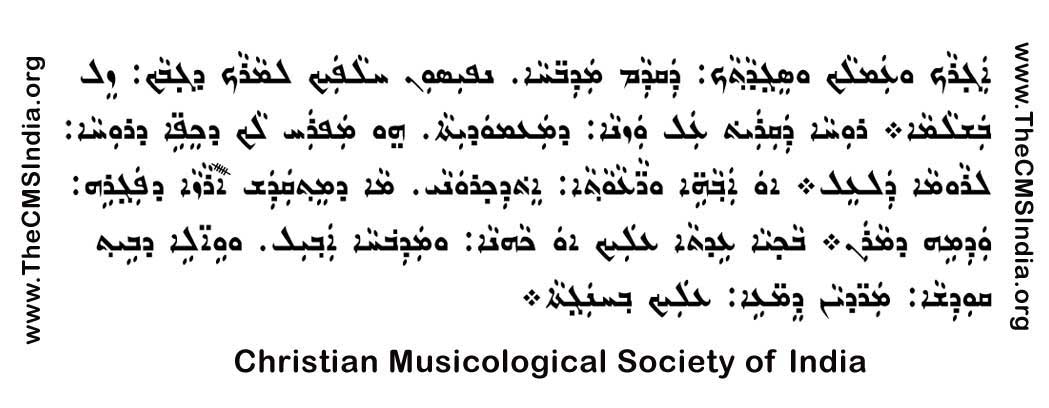
|
Malayalam version (Wita wangunnen - വിട വാങ്ങുന്നെ )
- Sung by Fr. Abel, C. M. I. Recorded on 20 Sep 1997 at Joseph J. Palackal's office in Maspeth, New York during Fr. Abel's visit to U. S. A.
- Sung by Fr. George Plathottam (1933-2016) . Recorded on 3 September 2011 at Old Cathedral Church, Pala, Kerala, India (Aramaic project Video - 81A)
The version of Fr. Abel is slightly different from Fr. Perumalil's renditions. For example, the highest pitch in the melody in Fr. Plathottam's version appears in the first phrase, whereas it appears in the second phrase in the other two versions. Fr. Abel's and Fr. Perumalil's versions seem to be musically more logical.
Syriac Version
- Sung by Fr. Probus Perumalil, C. M. I.(1922-2009) can be heard on track 18 from the Qambel Maran CD . Fr. Perumalil 's rendition has a different vocal inflection.
- Sung by Fr. George Plathottam (1933-2016) Recorded on 3 September 2011 at Old Cathedral Church, Pala, Kerala, India (Aramaic project Video -81)
Printed Pages
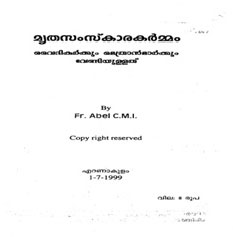
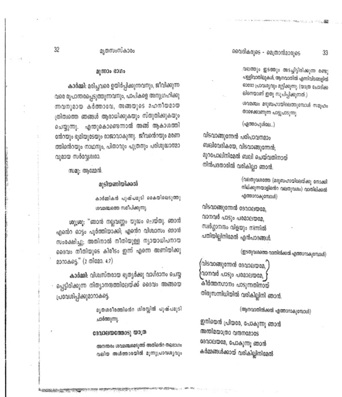
Joseph J. Palackal
New York
7-Feb-2018
Transliteration & Translation (Malayalam)
Transliteration and translation (by Fr. Abel Periyappuram, CMI) of the Malayalam version
| Transliteration | Translation |
|
1. Wiṭa wāngunnēn paripāwanamām 2. Wiṭa wāngunnēn dēwālayame, 3. Wiṭa wāngunnēn dēwālayame, 4. Iniyen pṛiyare, |
1. May I take leave,
2. May I take leave,
O House of God, 3. May I take leave,
O House of God, 4. Now, my beloved people, |
Transliteration & Translation (English)
Transliteration and translation (by Fr. Thomas Kalayil, CMI) of the Syriac text.
| Transliteration | Translation |
|
1. Ēthâpūš(y) lēk(y) bašlāmâ: ʾāzēlnâlî: 2. ʾAḥaywḥabrayḥabbībay: ͑ubdūhyldukrān(y): 3. ʾĀzēlnâwlâdāhēlnâ: dmār(y) qārêlî: 4. Malaʾkâdetâwdabrāk: la ͑dēnnāwblāk: 5. Pūš(w) bašlāmâkahnêzhayyâ: dperšētmenkōn: 6. Pūš(w) bašlāmâʾaḥaywḥabray: wabnay ͑enyān(y): 7. Pūš(w) bašlāmâ ͑ammâgabyâ: kenšâprīqâ: 8. (If the departed priest was a Malpān) |
O church, remain in peace, I am going; My dear brothers and friends, celebrate my remembrance; I am going and am not afraid, my Lord is calling me; May the angel who came and took thee to Eden, lead thee; Remain in peace, O reverend priests, though I have departed from you; Remain in peace, O my brothers, my friends, and my companions; Remain in peace, O chosen people, redeemed congregation; O my disciples and my companions, do not bear me; |
Malayalam version (Wita wangunnen - വിട വാങ്ങുന്നെ )
- Aramaic Project 11.26 -Witawangunnen" Fr. Abel, CMI sings Malayalam version of Etha Pus Lek
- DCS-266 - വിടവാങ്ങുന്നേൻ' Witavangunnen' In Homage to Fr. Cherian Nereveetil. Voice of Fr. Abel CMI. | Goto Notes Page
Aramaic Project Recordings
| S.No. | Artist | Youtube Link | Aramaic Project Number | Notes |
| 1 | Fr. George Plathottam | Video | AP 81 | |
| 2 | Fr. Probus Perumalil | Video | AP 4P | |
| 3 | Fr. George Plathottam | Video | AP 81A | |
| 4 | Fr. Cyril Thayyil | Video. | AP 85 | |
| 5 | Fr. Abel CMI | Video | AP 12A | |
| 6 | Rev. Fr. Sebastian Sankoorikkal: | Video | AP 25A | |
| 7 | Fr George Vithayathil | Video | AP 131 | |
| 8 | Fr. Mathew Mattam | Video | AP 62DD | |
| 9 | Dr. Joseph J. Palackal | Video | AP 121 | |
| 10 | Fr. George Plathottam | Video | AP 140 | |
| 11 | Dr. Joseph J. Palackal | Video | AP 230 | |
| 12 | Fr. George Platottam | Video | AP 235 | |
| 13. | Fr. Emmanel Thelly CMI | Video | AP 236 | |
| 14. | Fr. Sebastian Sankoorikkal ( Malayalam Version) | Video | AP 238 |
Remarks:
See a detailed study of this chant in our Resources for research (Ref. Code 008-031) - The Survival Story of Syriac Chants among the St. Thomas Christians in South India
Copyright
Copyright: Christian Musicological Society of India. Do not use any part of this article without prior written permission from the Christian Musicological Society of India. For permission please send request to This email address is being protected from spambots. You need JavaScript enabled to view it.

